I’m not really sure who came up with the idea that you can’t use niacinamide and vitamin C together, but this is one of those skincare myths that spread around like wildfire and left many people concerned about combining these two actives.
Yes, you can use niacinamide and vitamin C together; however, as with any other active, you should use them to target specific skin conditions while always paying attention to what your skin needs.
In this article, we will talk about the benefits and risks of using niacinamide and vitamin C together as well as how to properly combine these two actives for best results.

Benefits of Using Niacinamide and Vitamin C Together

Here are a few benefits of using niacinamide and vitamin C together:
Fading hyperpigmentation
Both vitamin C and niacinamide are pigment inhibitors, and no, this doesn’t mean that they will lighten dark skin.
Instead, both actives can brighten hyperpigmentation which is a result of some sort of inflammation.
Vitamin C acts as a reducing agent at various oxidative steps of melanin formation, hence inhibiting melanogenesis, which is the process by which the brown pigment melanin is produced by melanocyte cells found in the deepest layer of the epidermis.
Niacinamide, on the other hand, is also an effective agent that works by inhibiting melanosome transfer from melanocytes (pigment-producing cells) to keratinocytes (skin cells), which means it will stop the uneven deposition of pigment on a cellular level and eventually help brighten the already existing hyperpigmentation on the surface of the skin.
Evening out skin tone
Once the process of uneven pigment deposition is regulated on a cellular level, vitamin C and niacinamide will continue to work on the skin’s surface to even out the skin tone and make the complexion more uniform.
Evening out skin texture
Both niacinamide and vitamin C can help smooth and even out skin texture.
Niacinamide does this by strengthening the skin barrier and helping the skin retain moisture, which will result in a smoother and more plump look.
Vitamin C, on the other hand, is supposed to accelerate the production of both collagen and elastin, and while the data that confirms this is weak, it has been noted that vitamin C does, however, improve texture by softening the outermost layers of the skin and making rough areas appear smoother.
Strengthening the skin barrier
Niacinamide is truly a powerhouse agent that has so many beneficial properties for the skin.
However, one of the most useful properties of niacinamide is the ability to improve epidermal barrier function by reducing trans-epidermal water loss and increasing the skin’s resistance to potentially harmful pathogens.
As it happens, once your skin barrier is strengthened, your skin will have an easier time dealing with other, minor issues such as redness and hyperpigmentation, but it will also be more resistant to irritation and future inflammation such as acne breakouts.
On the other hand, Vitamin C can boost the body’s production of ceramides and other lipids that are essential for our skin’s health, which will result in softer, more supple skin, and a strengthened skin barrier.
Risks of Using Niacinamide and Vitamin C Together
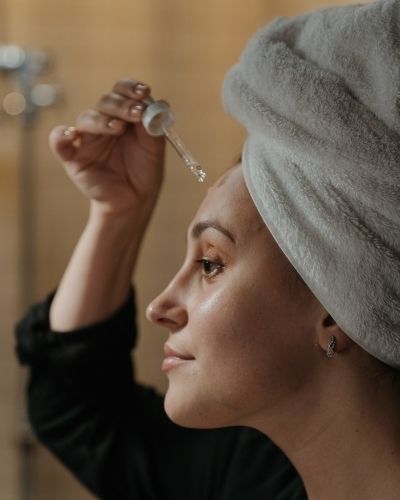
Here are a few things you should watch out for when using niacinamide and vitamin C together:
Irritation
Irritation may occur when using both niacinamide and vitamin C, and this can be due to several reasons:
- high concentrations of both actives
- overusing both actives
- using both actives with other strong actives such as retinoids, exfoliating acids, or acne medication
- not moisturizing enough
- not using sunscreen
So try to avoid doing these things as they will help avoid irritation.
Peeling
Peeling is a definite sign of overusing actives in high concentrations. Niacinamide in high concentrations is known to promote peeling, which is usually a bad sign.
Peeling is a normal reaction when using retinoids and some exfoliating acids, but not when using vitamin C and niacinamide, which means you should either give your products a break or at least minimize the use and follow up with a gentle, repairing moisturizer.
Breakouts
Another clear sign of irritation when using niacinamide and vitamin C is random breakouts.
This usually means that you are using a high concentration of a product your skin doesn’t like, or you are using an oily product that is clogging up your pores and causing your skin to break out.
Damaged skin barrier
This may sound a little strange, especially since I already mentioned both niacinamide and vitamin C can help strengthen the skin barrier; however, ignoring prolonged irritation from using both products can and will result in a damaged skin barrier.
In this case, it doesn’t mean the ingredient is bad, but it can mean a few other things, such as:
- overusing both actives
- not moisturizing enough
- using both actives with other strong actives (retinoids, exfoliating acids, anti-acne medications)
- not using sunscreen
- using high percentages of both actives (your skin may need a break or a milder concentration)
Therefore, you should always pay attention to how your skin reacts when using vitamin C and niacinamide.
If your skin starts showing signs of irritation, you may want to consider readjusting your routine so that you can avoid dealing with a damaged skin barrier.
7 Best Niacinamide and Vitamin C Products
Here are the seven best niacinamide and vitamin C products that can be used together:
Yeouth – Vitamin C & E Serum – $16
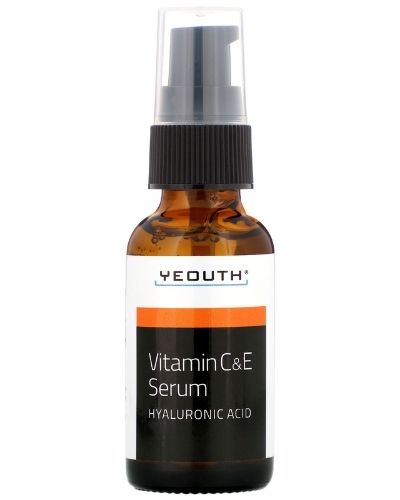
The Yeouth Vitamin C & E Serum is a very affordable vitamin C serum that uses a stable form of vitamin C known as Magnesium Ascorbyl Phosphate, as well as hyaluronic acid to plump and hydrate the skin.
The product is fragrance-free and has the consistency of a clear gel-like serum that glides easily on damp skin and wears well throughout the day.
Best for normal/dry/mature/sun-damaged skin.
First Aid Beauty – Radiance Niacinamide Serum – $42
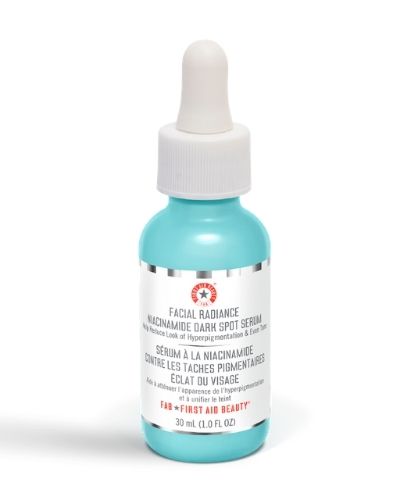
The First Aid Beauty Radiance Niacinamide Serum is a great, non-irritating option that aims to reduce the appearance of dark spots, UV-induced damage, mild hyperpigmentation, discoloration, uneven skin tone, as well as superficial post-acne scarring.
The product contains a low percentage of niacinamide, boosted by soothing licorice root extract and golden kiwifruit, which has antioxidant properties due to being rich in vitamin C as well as another carotenoid antioxidant known as Lutein.
Best for all skin types, including sensitive and acne-prone.
Typology Paris – 12% Niacinamide Serum – $28
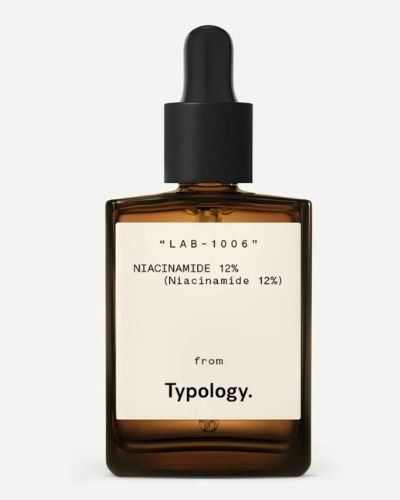
Typology’s 12% Niacinamide Serum is formulated with only ten ingredients, and all of them are intended to hydrate, soothe, refine, and brighten the skin.
It is fragrance-free and has a gel-like, slightly tacky consistency that may appeal more to oily skin types.
Best for all skin types, including sensitive and acne-prone.
Typology Paris – Radiance Serum 11% Vitamin C – $26
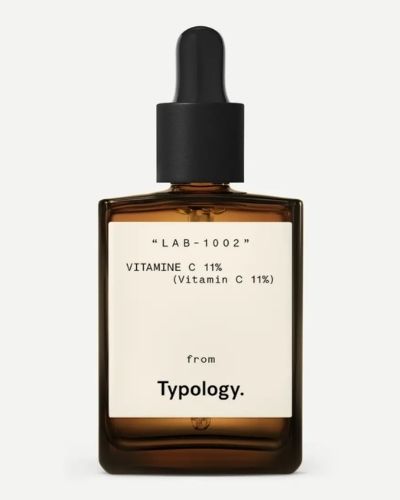
Typology’s Radiance Serum contains two active ingredients, including an 11% vitamin C serum that helps brighten the skin and remove signs of sun damage, as well as 3% Albizia Julibrissin extract, which comes from a plant native to Asia and has antioxidant, soothing, and replenishing properties.
The serum is also fragrance-free and has a gel-like consistency that’s suitable for oily skin types, which is something you don’t often see in vitamin C serums as they usually tend to lean towards a silky or oily consistency that’s more suitable for dry skin.
Best for normal/dry/combo/oily skin with sun damage and mild hyperpigmentation.
Vivant Skincare – PURE C + E – $82
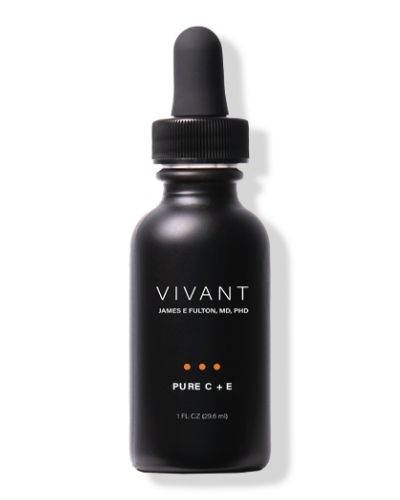
The Vivant Skincare Pure C + E is a lightweight serum that helps promote more even, smooth, and glowing skin while fading spots caused by environmental stressors.
The serum is enriched with antioxidants as well as urea which is an excellent hydrator, glycine – a natural amino acid that can help improve elasticity in the skin, as well as niacinamide and inositol – both members of the vitamin B family that help brighten the skin and strengthen the moisture barrier.
Best for all skin types with hyperpigmentation, discoloration, and sun damage.
SkinCeuticals – Discoloration Defense – $98
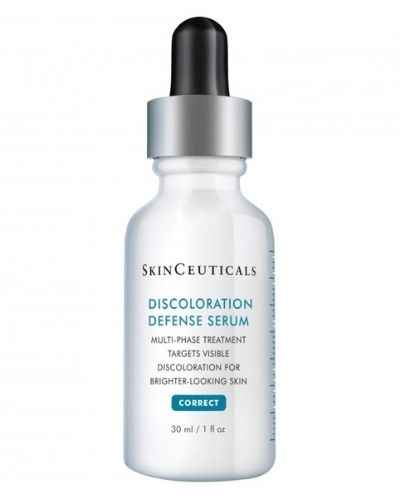
SkinCeuticals Discoloration Defense serum is a very good option if you are dealing with leftover hyperpigmentation and uneven skin tone as a result of more intense inflammation such as acne.
This multipurpose serum is a powerful treatment for dark patches and uses a combination of tranexamic and kojic acids as well as niacinamide to brighten dark spots.
Additionally, it contains a 5% concentration of HEPES, also called sulfonic acid, to provide even exfoliation, breaking up the dead skin cells on the skin’s surface.
Best for normal/dry/combo/oily skin with hyperpigmentation, discoloration, and texture.
SkinCeuticals – C E Ferulic – $166
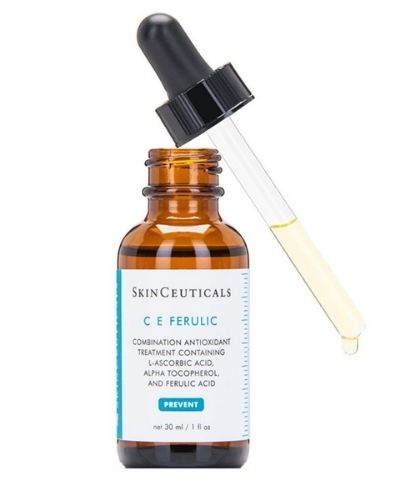
The SkinCeuticals C E Ferulic is definitely the best vitamin C serum in the market, and the SkinCeuticals team knows what they created, which is why they weren’t thinking twice before racking up that price tag.
Sitting on a “modest” $166 tag, this serum contains 15% pure L-ascorbic acid, which is one of the most potent forms of vitamin C that can be stabilized, alongside ferulic acid.
Together, they are clinically proven to reduce oxidative damage from the sun, ozone pollution, and exhaust by up to 41%.
The serum brightens the skin, removes dark spots, evens out uneven skin tone, and gives an unreal glow.
C E Ferulic can be used in combination with the above-mentioned Discoloration Defense for the ultimate brightening cocktail; however, avoid using them together more than once a day, and always follow up this combo with high SPF in the morning.
It’s best to apply C E Ferulic first on clean skin and follow it up with a few drops of Discoloration Defense.
Best for dry/mature skin with hyperpigmentation and sun damage.

My name is Simone and I am a certified skin specialist. I created this website to teach my readers how to take great care of their skin and I also like to occasionally share my honest opinions on skincare products I’ve tried. You can learn more about me here.
